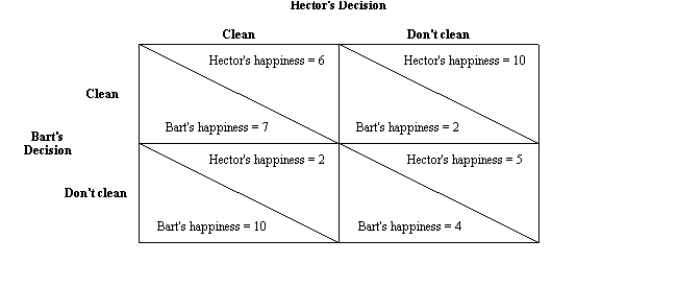Multiple Choice
Figure 17-3. Hector and Bart are roommates. On a particular day, their apartment needs to be cleaned. Each person has to decide whether to take part in cleaning. At the end of the day, either the apartment will be completely clean (if one or both roommates take part in cleaning) , or it will remain dirty (if neither roommate cleans) . With happiness measured on a scale of 1 (very unhappy) to 10 (very happy) , the possible outcomes are as follows: 
-Refer to Figure 17-3. The dominant strategy for Hector is to
A) clean, and the dominant strategy for Bart is to clean.
B) clean, and the dominant strategy for Bart is to refrain from cleaning.
C) refrain from cleaning, and the dominant strategy for Bart is to clean.
D) refrain from cleaning, and the dominant strategy for Bart is to refrain from cleaning.
Correct Answer:

Verified
Correct Answer:
Verified
Q30: Oligopolies produce more when they collude then
Q93: Why are the actions of firms interdependent
Q122: A central issue in the Microsoft antitrust
Q132: Why do economists use game theory to
Q308: Scenario 17-4.<br><br>Consider two cigarette companies, PM Inc.
Q309: As a group, oligopolists earn the highest
Q312: Table 17-28<br>Suppose that two firms determine that
Q313: Table 17-14<br>This table shows a game played
Q314: Table 17-20<br>Nadia and Maddie are two college
Q315: Scenario 17-5<br>Assume that a local restaurant sells